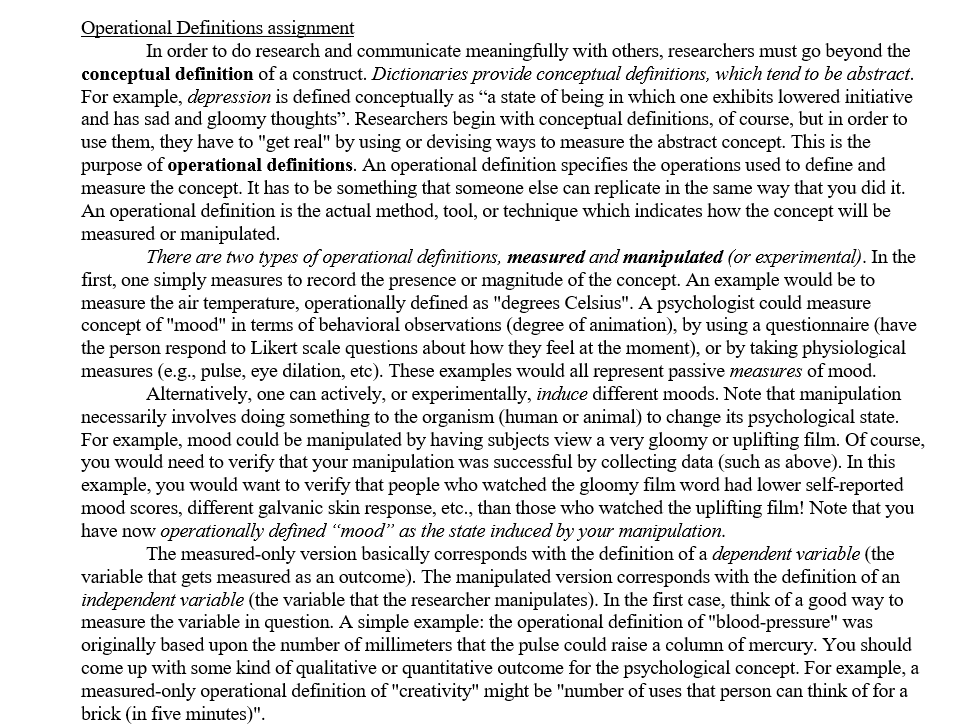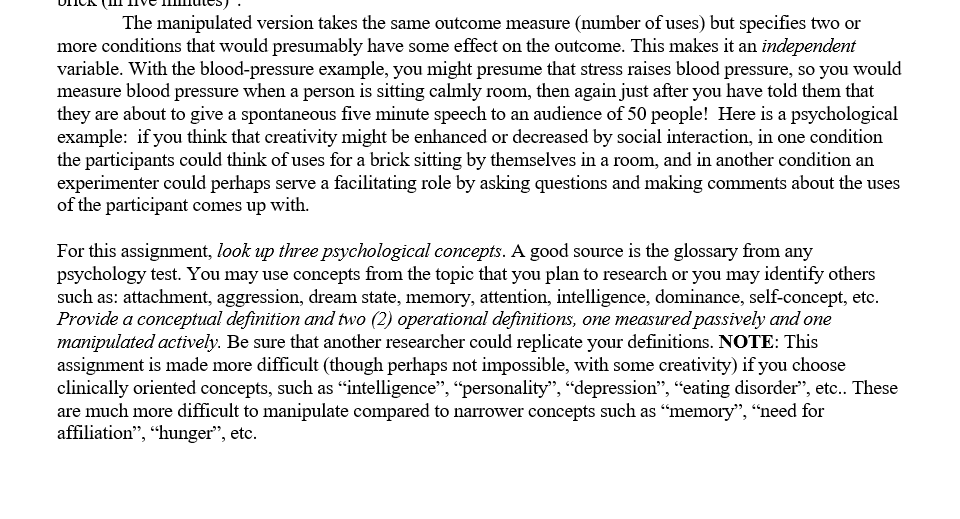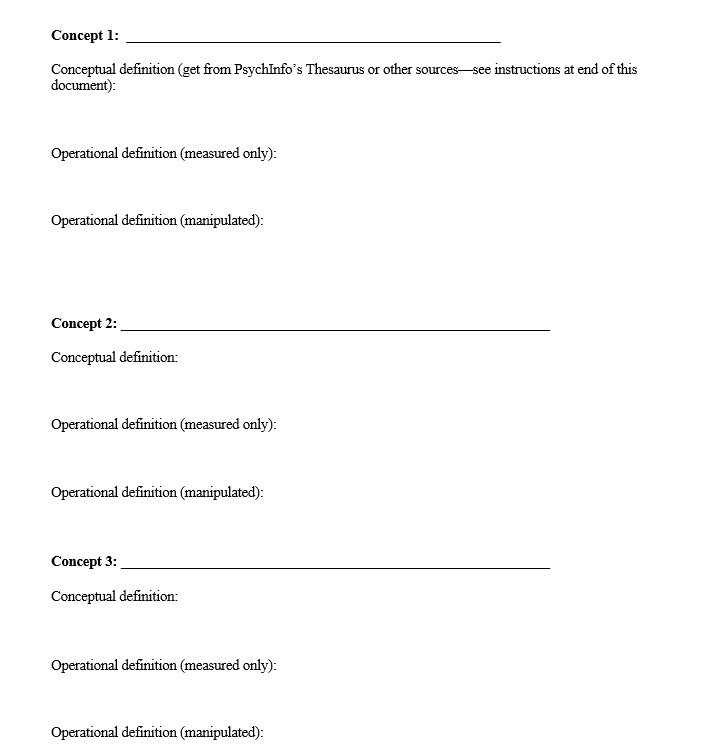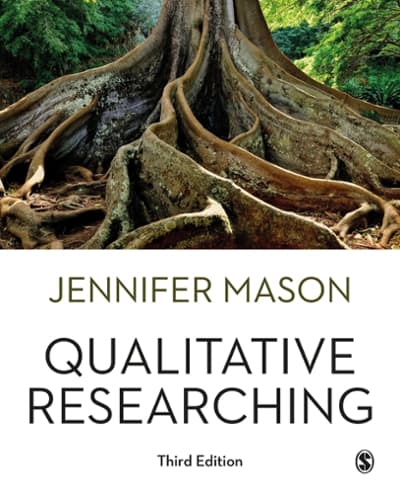Answered step by step
Verified Expert Solution
Question
1 Approved Answer
Operational Definitions assignment In order to do research and communicate meaningfully with others, researchers must go beyond the conceptual definition of a construct. Dictionaries



Operational Definitions assignment In order to do research and communicate meaningfully with others, researchers must go beyond the conceptual definition of a construct. Dictionaries provide conceptual definitions, which tend to be abstract. For example, depression is defined conceptually as "a state of being in which one exhibits lowered initiative and has sad and gloomy thoughts". Researchers begin with conceptual definitions, of course, but in order to use them, they have to "get real" by using or devising ways to measure the abstract concept. This is the purpose of operational definitions. An operational definition specifies the operations used to define and measure the concept. It has to be something that someone else can replicate in the same way that you did it. An operational definition is the actual method, tool, or technique which indicates how the concept will be measured or manipulated. There are two types of operational definitions, measured and manipulated (or experimental). In the first, one simply measures to record the presence or magnitude of the concept. An example would be to measure the air temperature, operationally defined as "degrees Celsius". A psychologist could measure concept of "mood" in terms of behavioral observations (degree of animation), by using a questionnaire (have the person respond to Likert scale questions about how they feel at the moment), or by taking physiological measures (e.g., pulse, eye dilation, etc). These examples would all represent passive measures of mood. Alternatively, one can actively, or experimentally, induce different moods. Note that manipulation necessarily involves doing something to the organism (human or animal) to change its psychological state. For example, mood could be manipulated by having subjects view a very gloomy or uplifting film. Of course, you would need to verify that your manipulation was successful by collecting data (such as above). In this example, you would want to verify that people who watched the gloomy film word had lower self-reported mood scores, different galvanic skin response, etc., than those who watched the uplifting film! Note that you have now operationally defined "mood" as the state induced by your manipulation. The measured-only version basically corresponds with the definition of a dependent variable (the variable that gets measured as an outcome). The manipulated version corresponds with the definition of an independent variable (the variable that the researcher manipulates). In the first case, think of a good way to measure the variable in question. A simple example: the operational definition of "blood-pressure" was originally based upon the number of millimeters that the pulse could raise a column of mercury. You should come up with some kind of qualitative or quantitative outcome for the psychological concept. For example, a measured-only operational definition of "creativity" might be "number of uses that person can think of for a brick (in five minutes)". The manipulated version takes the same outcome measure (number of uses) but specifies two or more conditions that would presumably have some effect on the outcome. This makes it an independent variable. With the blood-pressure example, you might presume that stress raises blood pressure, so you would measure blood pressure when a person is sitting calmly room, then again just after you have told them that they are about to give a spontaneous five minute speech to an audience of 50 people! Here is a psychological example: if you think that creativity might be enhanced or decreased by social interaction, in one condition the participants could think of uses for a brick sitting by themselves in a room, and in another condition an experimenter could perhaps serve a facilitating role by asking questions and making comments about the uses of the participant comes up with. For this assignment, look up three psychological concepts. A good source is the glossary from any psychology test. You may use concepts from the topic that you plan to research or you may identify others such as: attachment, aggression, dream state, memory, attention, intelligence, dominance, self-concept, etc. Provide a conceptual definition and two (2) operational definitions, one measured passively and one manipulated actively. Be sure that another researcher could replicate your definitions. NOTE: This assignment is made more difficult (though perhaps not impossible, with some creativity) if you choose clinically oriented concepts, such as "intelligence", "personality", "depression", "eating disorder, etc.. These are much more difficult to manipulate compared to narrower concepts such as memory, need for affiliation", "hunger", etc. Concept 1: Conceptual definition (get from PsychInfo's Thesaurus or other sources-see instructions at end of this document): Operational definition (measured only): Operational definition (manipulated): Concept 2: Conceptual definition: Operational definition (measured only): Operational definition (manipulated): Concept 3: Conceptual definition: Operational definition (measured only): Operational definition (manipulated):
Step by Step Solution
There are 3 Steps involved in it
Step: 1

Get Instant Access to Expert-Tailored Solutions
See step-by-step solutions with expert insights and AI powered tools for academic success
Step: 2

Step: 3

Ace Your Homework with AI
Get the answers you need in no time with our AI-driven, step-by-step assistance
Get Started


